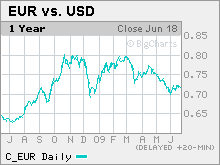Dollar rises on euro weakness
German business survey shows foggy outlook for the euro zone's largest economy. Investors wait for Fed's outlook.
NEW YORK (Reuters) -- The U.S. dollar rose against the euro Monday on concerns over the euro zone's economic and fiscal outlook, while higher-yielding currencies slipped on worries about global growth prospects.
The euro came under broad pressure and dropped near $1.38 after a closely-watched business climate survey in Germany painted a mixed picture about the euro zone's largest economy.
Investors awaited the U.S. Federal Reserve's policy-setting Open Market Committee meets later this week. The market is expecting the central bank to give a slightly brighter economic view while watching whether it will address a recent rise in Treasury debt yields.
"We're seeing the euro lower across the board and I think that's largely the result of the mixed Ifo data overnight as well as ongoing position squaring ahead of this week's FOMC meeting," said Omer Esiner, senior currency analyst at Travelex Global Business Payments in Washington.
"I think investors are hesitant to go into the meeting overly short U.S. dollars."
In early New York trading, the euro was down 0.7% at $1.3847 after hitting a session low of $1.3827, according to Reuters data.
Data showed German Ifo business climate index rose to 85.9 in June from 84.3 the previous month, beating forecasts of 85.2. However, the current conditions index was at 82.4, versus a forecast of 83.1.
"The worst should be over but the ongoing improvement is likely to be too weak to seriously discuss a recovery," said Carsten Brzeski, economist at ING Financial Markets.
The euro also fell 1.1% to ¥132.76 while the dollar dropped 0.4% to ¥95.87 according to electronic trading platform EBS.
The yen received a boost from falling appetite for risk in the market after the World Bank said Monday that prospects for the global economy remain "unusually uncertain" as it cut 2009 growth forecasts for most economies.
The Australian dollar fell 1.7% to $0.7926 while the New Zealand dollar fell 1.4% to $0.6333
Traders also cited concerns about Germany's widening budget shortfall as an excuse to sell euros. Germany will raise its net new borrowing target in 2010 to a record level that may exceed $139 billion as the country attempts to battle the financial crisis.
"Germany is the financial anchor of the euro zone. If there are fiscal problems in Germany, all the other states in the euro zone just crumble by the wayside," said Boris Schlossberg, director of currency research at GFT Forex in New York. "That's why the market is reacting so negatively."
The euro also came under pressure as the market awaited the European Central Bank's first ever one-year refinancing operation on Wednesday aimed at getting banks lending again and reducing the cost of borrowing for banks, firms and consumers.
Meanwhile, ECB Governing Council member Ewald Nowotny was quoted on Monday by news agency Bloomberg as saying the central bank was likely to keep interest rates on hold for the rest of this year.
Such a view confirmed market expectations after the ECB kept interest rates at a record low 1% earlier this month.
The fiscal situation in the United States will also be closely watched this week with a record $104 billion in U.S. Treasury debt to be auctioned this week. ![]()



